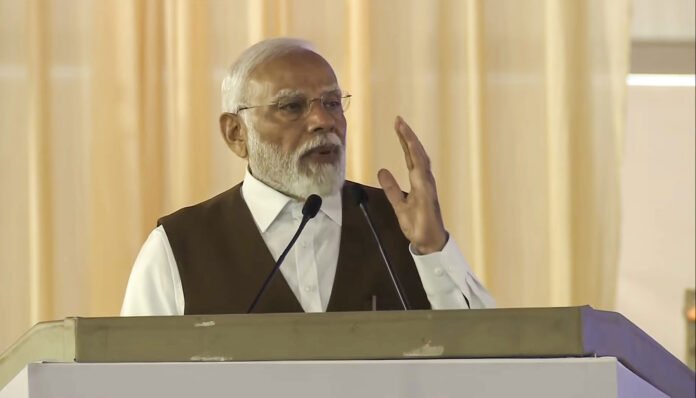Prime Minister Narendra Modi sent a powerful message against crimes committed on women, asserting that no individual, regardless of their position or influence, will escape justice. His remarks come at a crucial moment as protests erupted in Kolkata and other parts of West Bengal over recent incidents of violence against women. With thousands of demonstrators taking to the streets, demanding action and justice, Modi’s statement struck a chord with citizens and intensified the national debate on women’s safety.
The Prime Minister’s message, delivered during a public address, emphasized that accountability for crimes against women is non-negotiable. He reassured the nation that his government would take decisive steps to ensure justice for victims and hold perpetrators responsible, regardless of their political affiliations or social standing.
The Backdrop: Protests in Kolkata
The protests in Kolkata were sparked by a series of high-profile cases of violence against women in West Bengal. Activists, women’s rights groups, and opposition parties have accused the state government, led by the Trinamool Congress (TMC), of not doing enough to address rising cases of sexual assault and harassment. One recent case, involving the brutal assault of a young woman, caused widespread outrage, especially after reports surfaced that the accused had political connections.
Kolkata’s streets have seen an outpouring of frustration, with demonstrators demanding justice for the victims and swift punishment for the culprits. Protesters have accused the ruling TMC of shielding individuals with political clout, leading to allegations of selective justice and complicity. The demonstrations have brought attention to the broader issue of women’s safety in West Bengal, which has been a point of contention between the state and central governments.
PM Modi’s Message: Justice Above All
In his address, Prime Minister Modi emphasized that the fight against gender-based violence is a top priority for his government. He said, “No matter who the culprit is, they will not be spared. Justice will be served, and there will be no leniency based on political power or connections.” His words echoed the sentiment of many across the country, who feel that political interference often obstructs the path of justice in cases involving powerful figures.
Modi’s speech was seen as a direct response to the ongoing protests in Kolkata and criticism of the TMC’s handling of crimes against women. He assured citizens that his government would not tolerate any delay or obstruction in delivering justice. “The safety of women is not just the responsibility of one state, it is a national responsibility,” he added, calling for coordinated efforts between the Centre and the states to combat this pressing issue.
Political Implications and the TMC’s Response
Modi’s remarks have escalated the political battle between the Bharatiya Janata Party (BJP) and the Trinamool Congress (TMC) in West Bengal. While the BJP has accused the TMC of being soft on crimes involving its political allies, the TMC has countered by claiming that the central government is politicizing the issue of women’s safety to gain political mileage.
In response to Modi’s message, senior leaders from the TMC have denied any allegations of political interference in criminal investigations. They argue that the state government has taken strict actions to bring the perpetrators to justice in all cases. However, opposition leaders, particularly from the BJP and Congress, have demanded more transparency and accountability from the state administration.
The protests in Kolkata have given the opposition new momentum to challenge Chief Minister Mamata Banerjee’s government, particularly ahead of key elections. With women’s safety now taking center stage in political discourse, both parties are positioning themselves as champions of justice for victims of gender-based violence.
The Broader Context of Women’s Safety in India
India has witnessed a series of high-profile incidents of violence against women over the past decade, sparking a national movement for justice and legal reforms. From the 2012 Nirbhaya case in Delhi to more recent atrocities, there has been a growing demand for tougher laws, better policing, and swifter justice for victims.
The Modi government has taken several steps to address this issue, including strengthening laws on sexual violence, setting up fast-track courts to handle rape cases, and launching awareness campaigns on women’s safety. However, activists argue that the implementation of these measures remains inconsistent across states, with political influence often playing a role in obstructing justice.
What’s Next?
PM Modi’s message comes at a time when public anger over crimes against women is at an all-time high. His statement may help restore faith in the government’s resolve to address the issue, but activists and opposition parties will likely demand concrete action, not just rhetoric. The protests in Kolkata have brought to light the challenges faced by victims in accessing justice, especially in politically sensitive cases.
The Prime Minister’s call for non-discriminatory justice sends a clear message: no one is above the law. But translating this commitment into action will require continued vigilance, political will, and a concerted effort by both state and central governments to ensure that women’s safety is truly prioritized across the country.
Prime Minister Modi’s unequivocal stance against crimes on women amid the Kolkata protests reflects the gravity of the situation. As demands for justice grow louder, the government’s response to these crimes will be closely watched. Modi’s message that “no matter who the culprit is, justice will be served” is a reminder that safeguarding women’s safety must remain a non-partisan and national priority.
